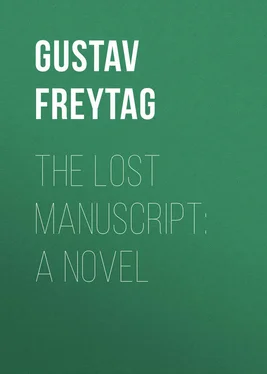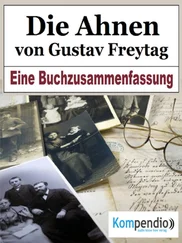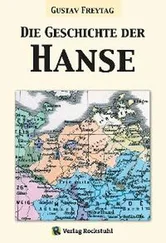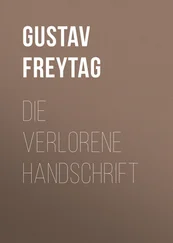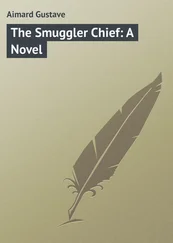Gustav Freytag - The Lost Manuscript - A Novel
Здесь есть возможность читать онлайн «Gustav Freytag - The Lost Manuscript - A Novel» — ознакомительный отрывок электронной книги совершенно бесплатно, а после прочтения отрывка купить полную версию. В некоторых случаях можно слушать аудио, скачать через торрент в формате fb2 и присутствует краткое содержание. Жанр: foreign_antique, foreign_prose, на английском языке. Описание произведения, (предисловие) а так же отзывы посетителей доступны на портале библиотеки ЛибКат.
- Название:The Lost Manuscript: A Novel
- Автор:
- Жанр:
- Год:неизвестен
- ISBN:нет данных
- Рейтинг книги:5 / 5. Голосов: 1
-
Избранное:Добавить в избранное
- Отзывы:
-
Ваша оценка:
- 100
- 1
- 2
- 3
- 4
- 5
The Lost Manuscript: A Novel: краткое содержание, описание и аннотация
Предлагаем к чтению аннотацию, описание, краткое содержание или предисловие (зависит от того, что написал сам автор книги «The Lost Manuscript: A Novel»). Если вы не нашли необходимую информацию о книге — напишите в комментариях, мы постараемся отыскать её.
The Lost Manuscript: A Novel — читать онлайн ознакомительный отрывок
Ниже представлен текст книги, разбитый по страницам. Система сохранения места последней прочитанной страницы, позволяет с удобством читать онлайн бесплатно книгу «The Lost Manuscript: A Novel», без необходимости каждый раз заново искать на чём Вы остановились. Поставьте закладку, и сможете в любой момент перейти на страницу, на которой закончили чтение.
Интервал:
Закладка:
But a still greater surprise awaited the Doctor; his quiet labor was supported by the good deceased Brother Tobias himself. The friends descended one day to Rossau, accompanied by the Proprietor, who had business in the town. He conducted his guests to the Burgomaster, whom he requested to lay before the gentlemen, as trustworthy men, whatever old writings were in the possession of the authorities. The Burgomaster, who was a respectable tanner, put on his coat and took the learned men to the old monastery. There was not much to be seen; only the outer walls of the old building remained; the minor officials of the crown dwelt in the new parts. Concerning the archives of the council the Burgomaster suggested as probable that there would not be much found in them; in this matter he recommended the gentlemen to the town-clerk, and went himself to the club in order, after his onerous duties, to enjoy a quiet little game of cards.
The town-clerk bowed respectfully to his literary colleagues, laid hold of a rusty bunch of keys, and opened the small vault of the city hall, where the ancient records, covered with thick dust, awaited the time in which their quiet life was to be ended under the stamping machine of a paper mill. The town-clerk had some knowledge of the papers; he understood fully the importance of the communication which was expected from him, but assured them with perfect truth that, owing to two fires in the town and the disorders of former times, every old history had been lost. There were also no records to be found in any private house; only in the printed chronicles of a neighboring town some notices were preserved concerning the fate of Rossau in the Thirty Years' War. After the war, the place had been left a heap of ruins and almost uninhabited. Since that time the town had lived along without a history, and the town-clerk assured them that nothing was known here of the olden time, and no one cared about it. Perhaps something about the town might be learnt at the Capital.
Our friends continued to walk unweariedly from one intelligent man to another, making inquiries, as in the fairy tale, after the bird with the golden feather. Two little gnomes had known nothing, but now there remained a third-so they went to the Roman Catholic priest. A little old gentleman received them with profound bows. The Professor explained to him, that he was seeking information concerning the ultimate fate of the monastery-above all, what had happened in his closing years to the last monk, the venerable Tobias Bachhuber.
"In those days no register of deaths was required," replied the ecclesiastic. "Therefore, my dear sirs, I cannot promise to give you any information. Yet, if it is only a question of yourselves, and you do not wish to extract anything from the old writings disadvantageous to the Church, I am willing to show you the oldest of the existing books." He went into a room and brought out a long thin book, the edges of which had been injured by the mould of the damp room. "Here are some notices of my predecessors who rest with the Lord; perhaps they may be useful to the gentlemen. More I cannot do, because there is nothing else of the kind existing."
On the introductory page there was a register of the ecclesiastical dignitaries of the place in Latin. One of the first notices was: "In the year of our Lord 1637, and in the month of May, our venerated brother Tobias Bachhuber, the last monk of this monastery, died of the plague. The Lord be merciful to him."
The Professor showed the passage silently to his friend the Doctor, who wrote down the Latin words; they then returned the book with thanks and took their leave.
"The manuscript after all lies in the house," said the Professor, as they went along the street. The Doctor thought of the three crosses and laughed quietly to himself; he had in no way assented to the tactics which his friend thought fit to adopt for the discovery of the manuscript. When the Professor maintained that their only hope rested on the sympathy which they might by degrees awaken in their host, the Doctor entertained the suspicion that his friend was brought to this slow way of carrying on the war not by pure zeal for the manuscript.
The Proprietor, however, maintained an obstinate silence regarding the manuscript. If the Doctor threw out any hint upon the subject, the host made a wry grimace and immediately changed the conversation. It was necessary to put an end to this. The Doctor now determined to insist upon a decision before his departure. When, therefore, they were sitting together in the garden in the evening, and the Proprietor was looking cheerfully and calmly on his fruit trees, the Doctor began the attack:
"I cannot leave this place, my hospitable friend, without reminding you of our contract."
"Of what contract?" inquired their host, like one who did not remember it.
"Regarding the manuscript," continued the Doctor, with emphasis, "which lies concealed in this place."
"Indeed! why you yourself said that every place sounds hollow. So we would have to tear down the house from roof to cellar. I should think we might wait till next spring. When you come to us again; for we should be obliged, under these circumstances, to live in the barns, which now are full."
"The house may, for the present, remain standing," said the Doctor; "but if you still think that the monks took away their monastic property, there is one circumstance which goes against your view. We have discovered at Rossau that the worthy friar, who had concealed the things here in April, died of the pestilence as early as May, according to the church register; here is a 'copy of the entry.'"
The Proprietor looked at the Doctor's memorandum book, closed it and said: "Then his brother monks have taken away the property."
"That is scarcely possible," replied the Doctor, "for he was the last of his order in the monastery."
"Then some of the city people have taken it."
"But the inhabitants of the town abandoned it then, and the place lay for years desolate, in ruins and uninhabited."
"Humph!" began the Proprietor, in good humor; "the learned gentlemen are strict creditors and know how to insists upon their rights. Tell me straightforwardly what you want of me. You must, first of all, point out to me some place that appears suspicious, not only to you, but also to the judgment of others; and that you cannot do with any certainty."
"I know of such a place," answered the Doctor, boldly, "and I wish to suggest to you that the treasure lies there."
The Professor and the Proprietor looked on him with astonishment.
"Follow me into the cellar," cried the Doctor.
A candle was lighted; the Doctor led the way to the place where the wine lay.
"What gives you such victorious confidence?" inquired the Professor, on the way, in a low voice.
"I suspect that you have your secrets," replied the Doctor; "permit me to have mine."
He quickly removed the bottles from the corner, threw the light on the stone, and knocked on the wall with a large key.
"The place is hollow and the stone has a peculiar mark."
"It is true," said the Proprietor; "there is an empty space behind it; it is certainly not small. But the stone is one of the foundation stones of the house, and has not the appearance of ever having been removed from its place."
"After so long a time, it would be difficult to determine that," rejoined the Doctor.
The Proprietor examined the wall himself.
"A large slab lies over it. It would, perhaps, be possible to raise the marked stone from its place." He considered for a moment, and then continued: "I see I must let you have your own way. I will thus make compensation for the first hour of our acquaintance, which has always lain heavy on my conscience. As we three are here in the cellar like conspirators, we will enter into an agreement. I will at once do what I consider to be very useless. In return, whenever you speak or write upon the subject, you must not refuse to bear testimony that I have given in to every reasonable wish."
Читать дальшеИнтервал:
Закладка:
Похожие книги на «The Lost Manuscript: A Novel»
Представляем Вашему вниманию похожие книги на «The Lost Manuscript: A Novel» списком для выбора. Мы отобрали схожую по названию и смыслу литературу в надежде предоставить читателям больше вариантов отыскать новые, интересные, ещё непрочитанные произведения.
Обсуждение, отзывы о книге «The Lost Manuscript: A Novel» и просто собственные мнения читателей. Оставьте ваши комментарии, напишите, что Вы думаете о произведении, его смысле или главных героях. Укажите что конкретно понравилось, а что нет, и почему Вы так считаете.
